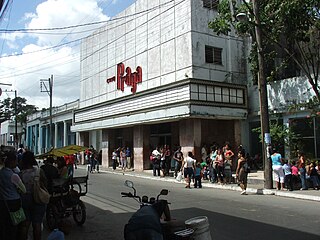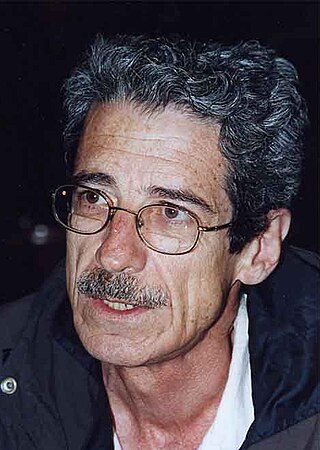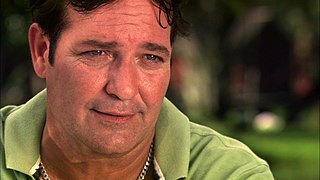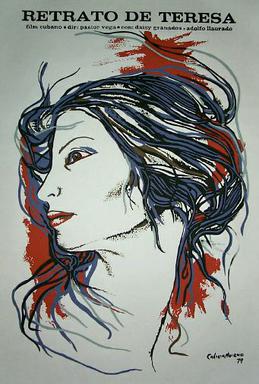Related Research Articles

Cinema arrived in Cuba at the beginning of the 20th century. Before the Cuban Revolution of 1959, about 80 full-length films were produced in Cuba. Most of these films were melodramas. Following the revolution, Cuba entered what is considered the "Golden age" of Cuban cinema.

Guillermo Cabrera Infante was a Cuban novelist, essayist, translator, screenwriter, and critic; in the 1950s he used the pseudonym G. Caín, and used Guillermo Cain for the screenplay of the cult classic film Vanishing Point (1971).
Tomás Gutiérrez Alea was a Cuban film director and screenwriter. Gutiérrez Alea wrote and directed more than twenty features, documentaries, and short films, which are known for his sharp insight into post-Revolutionary Cuba, and possess a delicate balance between dedication to the revolution and criticism of the social, economic, and political conditions of the country.

Fernando Pérez Valdés is a prominent Cuban film director.
Jorge Luis Sánchez is a Cuban film director. He was a founder of the Federación Nacional de Cine Clubes de Cuba - the Nacional Federation of Cine Clubs of Cuba.
Humberto Solás was a Cuban film director, credited with directing the film Lucía (1968), which explored the lives of Cuban women during different periods in Cuban history.
Cecilia Valdés is both a novel by the Cuban writer Cirilo Villaverde (1812–1894), and a zarzuela based on the novel. It is a work of importance for its quality, and its revelation of the interaction of classes and races in Havana, Cuba.

Trova is a style of Cuban popular music originating in the 19th century. Trova was created by itinerant musicians known as trovadores who travelled around Cuba's Oriente province, especially Santiago de Cuba, and earned their living by singing and playing the guitar. According to nueva trova musician Noel Nicola, Cuban trovadors sang original songs or songs written by contemporaries, accompanied themselves on guitar, and aimed to feature music that had a poetic sensibility. This definition fits best the singers of boleros, and less well the Afrocubans singing funky sones or even guaguancós and abakuá. It rules out, perhaps unfairly, singers who accompanied themselves on the piano.

Rita Aurelia Fulcida Montaner y Facenda, known as Rita Montaner, was a Cuban singer, pianist and actress. In Cuban parlance, she was a vedette, and was well known in Mexico City, Paris, Miami and New York, where she performed, filmed and recorded on numerous occasions. She was one of Cuba's most popular artists between the late 1920s and 1950s, renowned as Rita de Cuba. Though classically trained as a soprano for zarzuelas, her mark was made as a singer of Afro-Cuban salon songs including "The Peanut Vendor" and "Siboney".
Cuban musical theatre has its own distinctive style and history. From the 18th century to modern times, popular theatrical performances included music and often dance as well. Many composers and musicians had their careers launched in the theatres, and many compositions got their first airing on the stage. In addition to staging some European operas and operettas, Cuban composers gradually developed ideas which better suited their creole audience. Characters on stages began to include elements from Cuban life, and the music began to reflect a fusion between African and European contributions.

Jorge Perugorría Rodríguez is a Cuban actor, film director and painter. He is well known for his part as Diego in Strawberry and Chocolate (original title in Spanish Fresa y chocolate. He recently acted in Steven Soderbergh's Che, with Benicio del Toro and in the original Netflix series Four Seasons in Havana. He lives in Santa Fe, a neighborhood on the outskirts of Havana, with his wife Elsa Maria Fuentes de La Paz and their four children.
Cecilia is a 1982 Cuban drama film directed by Humberto Solás and starring Daisy Granados. The film is based on the novel Cecilia Valdés by Cirilo Villaverde. It was entered into the 1982 Cannes Film Festival.

A Successful Man is a 1986 Cuban drama film directed by Humberto Solás. It was screened in the Un Certain Regard section at the 1987 Cannes Film Festival and it was entered into the 15th Moscow International Film Festival. It won Best Production Design and Grand Coral - First Prize in the 1986 Havana Film Festival. The film was selected as the Cuban entry for the Best Foreign Language Film at the 60th Academy Awards, but was not accepted as a nominee.
Juan Carlos Cremata Malberti is a Cuban film director. He started his career as an author and actor for children's TV shows made for the Cuban Institute of Radio and Television from 1981 to 1987. He is known for directing the movie Viva Cuba, which received the Best Children's Film award at the Cannes International Film Festival in 2005.
The 11th Moscow International Film Festival was held from 14 to 28 August 1979. The Golden Prizes were awarded to the Italian-French film Christ Stopped at Eboli directed by Francesco Rosi, the Spanish film Siete días de enero directed by Juan Antonio Bardem and the Polish film Camera Buff directed by Krzysztof Kieślowski.

Portrait of Teresa is a 1979 Cuban drama film directed by Pastor Vega. It was entered into the 11th Moscow International Film Festival. Daisy Granados won the award for Best Actress.

Wilma Alba Cal is a Cuban composer of contemporary classical music. Her work has been recognized in several competitions in Cuba organized by National Union of Writers and Artists of Cuba (UNEAC), Instituto Superior de Arte, Asociación Hermanos Saíz and Instituto Cubano de la Música. Her catalog includes chamber, choir, electroacoustic and orchestral music, in addition to soundtracks for theatre and audiovisual works.
Verónica Lynn López Martínez is a Cuban actress and theatre director with an extensive career in film, theatre, radio and television. She founded the theater group Trotamundos in 1989 with Pedro Álvarez, her husband.

María Isabel Díaz Lago is a Cuban actress. A graduate of the Instituto Superior de Arte, her first film role was in Una novia para David. She became the first Cuban "Almodóvar girl", appearing in the 2006 film Volver. On the small screen, she is best known for her role as Soledad "Sole" Núñez Hurtado on Locked Up. She has resided in Spain since 1996.

Things I Left in Havana is a 1997 Spanish film directed by Manuel Gutiérrez Aragón and co-written by Senel Paz. It stars Violeta Rodríguez, Jorge Perugorría and Kiti Mánver.
References
- ↑ "Daisy Granados Biography". lahiguera. Retrieved 20 January 2013.
- ↑ "11th Moscow International Film Festival (1979)". MIFF. Archived from the original on 3 April 2014. Retrieved 20 January 2013.
- ↑ "14th Moscow International Film Festival (1985)". MIFF. Archived from the original on 16 March 2013. Retrieved 8 February 2013.
- ↑ Chanan, Michael (2004). Cuban Cinema (2nd ed.). Minneapolis: University of Minnesota Press. ISBN 0-8166-3423-8.